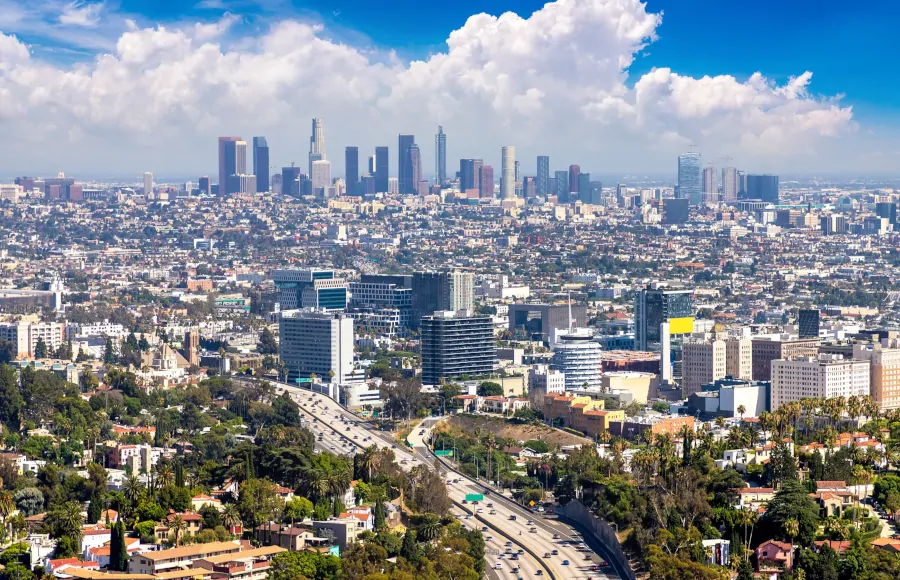Convenient access to diverse transportation options greatly benefits businesses engaged in shipping goods across various destinations.
For companies supplying components crucial to manufacturing processes, access to intermodal facilities has become indispensable, especially with the increasing adoption of just-in-time and similar supply chain management methodologies among manufacturers.
Municipalities across the United States have endeavored to address the requirements of shipping companies.
However, specific American urban centers are uniquely advantaged due to their natural geography and historical significance as transportation hubs, providing them with a distinct edge in logistics.
The following cities stand out as Top 5 USA cities of logistical leaders, serving as optimal bases for businesses to dispatch their products efficiently. Moreover, they are strategically positioned for enterprises reliant on prompt product deliveries.
Fifth – Atlanta

Atlanta’s position as the unofficial hub of the New South has propelled Hartsfield-Jackson Atlanta International Airport to the title of the world’s busiest airport in terms of passenger traffic. Although the airport’s cargo operations are overshadowed by its passenger business, Atlanta maintains its status as a significant cargo transportation hub.
Benefiting from its unique position as one of the few American cities served by three major Interstate highways – 20, 75, and 85 – Atlanta naturally emerges as a central hub for trucking operations.
According to Logistics List, Atlanta boasts over 75 Class A scheduled motor carriers and hosts a diverse array of more than 2,000 commodity carriers, contract haulers, and irregular intrastate route carriers.
Furthermore, Atlanta retains its importance as a key rail transportation hub. The metropolitan area’s numerous intermodal depots facilitate seamless freight interchange between different modes of transportation.
Fourth – Memphis

While Memphis benefits from its advantageous riverfront position along the Mississippi River, it was the strategic choice of FedEx to establish its SuperHub in the city that catapulted it to prominence as a leading logistics hub in the United States.
Nevertheless, Memphis’s accessibility to inland waterways and its extensive network of interstate highways contribute to its multifaceted appeal as a transportation nexus. With five Class I railroads servicing the city. And its international airport ranking top in the nation for cargo throughput in 2012, largely due to FedEx activity. Memphis solidifies its status as a pivotal transportation center.
Memphis boasts a dynamic and diverse economy supported by industries such as healthcare, manufacturing, and distribution. The city is home to several Fortune 500 companies and has a strong presence in the biomedical and biotechnology sectors, with institutions like St. Jude Children’s Research Hospital and the University of Tennessee Health Science Center driving innovation and research.
Furthermore, Memphis serves as a crucial distribution and warehousing hub, owing to its central location within the United States. The city’s logistical advantages, combined with its business-friendly environment and supportive economic development initiatives, make it an attractive destination for companies looking to establish or expand their operations.
Third – Houston

For many years, Houston has been a prominent hub for transportation. Enjoying significant advantages from the expansion of trilateral trade between the United States, Canada, and Mexico facilitated by the North American Free Trade Agreement (NAFTA).
Moreover, the growth of Houston as a pivotal trade and transportation hub has been propelled by initiatives like the Caribbean Basin Initiative. Granting Caribbean nations increased access to the US market. The Port of Houston stands out as one of the busiest maritime gateways in America. While George Bush Intercontinental Airport handles substantial volumes of international trade.
Houston’s stature as a premier logistics center is further solidified by its extensive network of highways and rail connections linking it to destinations across the United States, as well as to Canada and Mexico.
Second – Los Angeles

Los Angeles, the second-largest city in the United States, is home to the busiest port in the nation.
Despite a slow and humble beginning in container handling, the port has evolved into one of the world’s largest container hubs.
Various factors contribute to the port’s swift expansion, including the economic upsurge in many Asia-Pacific countries and the opening of the Panama Canal in the early 20th century. Which enhanced Los Angeles’ accessibility and economic ties with European and African ports.
Adjacent to the bustling port is the prominent Los Angeles International Airport. Complemented by five other commercial airports within the metropolitan area, providing Los Angeles with impressive airlift capacity.
Despite occasional jests, the city’s intricate network of freeways positions it naturally as a hub for trucking transportation. While railroads in the Los Angeles vicinity boast extensive facilities for seamless intermodal transfers between trucks and ships.
First – Chicago

In the early 20th century, Chicago emerged as a pivotal transportation nexus, dominating as the primary railroad hub in the United States.
Despite the subsequent rise of alternative transportation modes over the years, railroads continue to hold significance within the broader intermodal framework.
However, Chicago’s transportation advantages extend well beyond its railroad legacy.
Situated on the shores of Lake Michigan and bordered by the Chicago and Calumet rivers. The city enjoys convenient access to a network of inland waterways and global markets via the Great Lakes and St. Lawrence Seaway. Besides boasting its own port facilities, Chicago is in close proximity to the Port of Indiana at Burns Harbor.
O’Hare International Airport in Chicago ranks prominently among the leading US airports for cargo throughput. Complemented by the extensive highway infrastructure of the metropolitan area, establishing it as a pivotal hub for overland transportation. Furthermore, Chicago’s logistics dominance is reinforced by a robust intermodal network facilitating seamless goods transfer between various transportation modes.